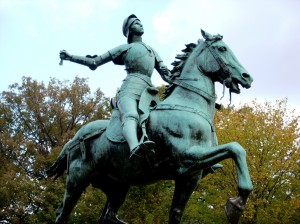Powerless Heroes
I know this article should really be called ‘Powerless Protagonists’ or ‘Powerless Main Characters’ but I couldn’t resist the nuance of ‘Powerless Heroes’. What I’m talking about is the tendency of many stories to have a main character who is helpless. Put upon. A loser.
I was reading a book the other day – and it shall remain nameless – when I ran into a character like this. He lurched from disaster to disaster. Relationships soured as soon as he touched them, like that milk at the back of the fridge. Businesses went downhill as soon as he joined. Weather became inclement the moment he stepped outside. He was hapless, in the extreme. I think we were meant to feel sorry for him, to sympathise with him as an everyman, but I just grew more and more irritated – and then I had an insight.
You see, it isn’t just that he was a victim of circumstance, it was his reaction to all this. Hardship didn’t make him stronger, didn’t make him more determined – he simply bore it with what was meant to be good grace but came across as peevish whining.
When writing, I maintain that main characters should be powerful in two senses. Firstly, he or she needs to be in a position to act. By that, I mean she or he should be physically able to affect events in the novel. For instance, a hermit, all alone on an island, is probably a poor choice as a protagonist in a story about the wheelings and dealings in political circles in Whitehall, where up and coming crusader Holly Stanthorpe is caught up in a controversy that shows us the seamy side of the historic buildings clique. No, Holly Stanthorpe is better placed to be the main character, instead of poor shipwrecked Ishmael Callaghan, having to read about events by way of the erratic delivery of messages in bottles.
Secondly, your main character should be psychologically able to act. This doesn’t have to mean that they are out and out action heroes, ready to disarm the terrorist using materials close at hand, no matter how appealing that might seem. And it doesn’t mean that they are successful in their attempts to act, but to drive the novel forward, to engage a reader as an accomplice, the main character should, at some time in the story, make decisions that affect the events unfolding in the narrative.
Without being physically able to act and psychologically able to act, we have main characters who are buffeted about by the seas of fate and destiny. This is all well and good for navigational buoys, but deadly dull if you’re a reader – or a writer.

read and noted, My Pryor. 🙂